
Stylocheilus is a genus of sea slugs, specifically sea hares, marine opisthobranch gastropod mollusks in the family Aplysiidae, the sea hares.

A salp or salpa is a barrel-shaped, planktic tunicate. It moves by contracting, thereby pumping water through its gelatinous body, one of the most efficient examples of jet propulsion in the animal kingdom. The salp strains the pumped water through its internal feeding filters, feeding on phytoplankton.

Onchidella is a genus of small, air-breathing sea slugs, shell-less marine pulmonate gastropod molluscs in the family Onchidiidae.

Siphonaria is a genus of air-breathing sea snails or false limpets, marine pulmonate gastropod molluscs in the family Siphonariidae, the false limpets.

Emarginula is a genus of small keyhole limpets, marine gastropod molluscs in the family Fissurellidae.

Patelloida is a genus of sea snails or true limpets, marine gastropod molluscs in the subfamily Lottiinae of the family Lottiidae, one of the families of true limpets.
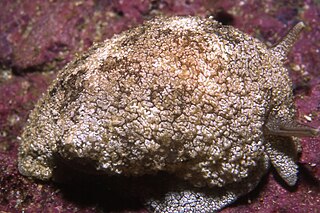
Pleurobranchaea is a genus of sea slugs, specifically sidegill slugs or notaspideans. These are marine gastropod molluscs in the family Pleurobranchaeidae. The genus is differentiated from other sidegill slugs by its rhinophores, which are well separated, rather than being joined under the notum. This genus has recently been coined sea owls which is the common name in Japanese for Pleurobranchaea japonica.

Hemitoma is a genus of slit limpets, marine gastropod molluscs in the family Fissurellidae, the keyhole limpets and slit limpets.
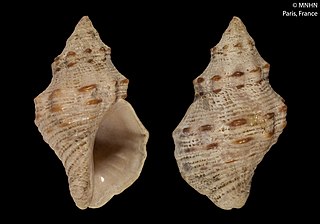
Phycothais reticulata is a species of sea snail, a marine gastropod mollusk in the family Muricidae, the murex snails or rock snails.
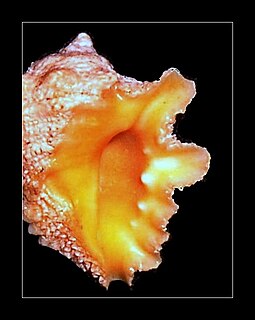
Drupa is a genus of sea snails, marine gastropod mollusks in the family Muricidae, the murex snails or rock snails.
Quoyula is a genus of sea snails, marine gastropod mollusks in the family Muricidae, the murex snails or rock snails.
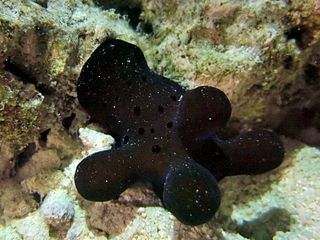
Coriocella is a genus of small slug-like sea snails, marine gastropod molluscs in the family Velutinidae.
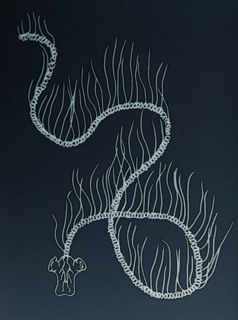
Prayidae is a family of marine invertebrates in the order Siphonophorae. They are colonial, and the colonies can superficially resemble jellyfish; although they appear to be a single organism, each specimen is actually a colony of Siphonophora.
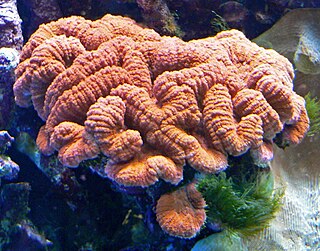
Lobophyllia, commonly called lobed brain coral or lobo coral, is a genus of large polyp stony corals. Members of this genus are sometimes found in reef aquariums.

Dendrophylliidae is a family of stony corals. Most members are azooxanthellate and thus have to capture food with their tentacles instead of relying on photosynthesis to produce their food. The World Register of Marine Species includes these genera in the family:

Montfortia is a genus of sea snails, marine gastropod mollusks in the family Fissurellidae, the keyhole limpets and slit limpets.

Alveopora is a genus of colonial stony corals in the family Acroporidae. Members of this genus are native to the Indo-Pacific region and are often found on reef slopes in turbid water. They are generally uncommon.
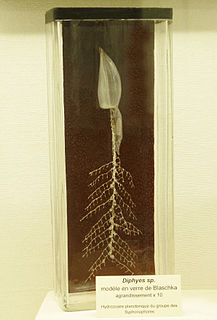
The Diphyidae are a family of siphonophores. These are colonial siphonophores with two nectophores arranged one behind the other. The front one includes a somatocyst, while the hind one does not. The somatocyst often contains an oil droplet for buoyancy control. A nectosac in each nectophore allows the organism to swim efficiently.

Stylocheilus striatus is a species of sea hare found in the Indo-pacific region living from the intertidal zone to a depth of 30 metres. Common names include lined sea hare, blue ring sea hare and furry sea hare. Mature animals can reach sizes of up to 65 mm in length and are brown in colour with blue spots. Their diet mainly consists of blue algae. They play an important role in controlling toxic blooms of the cyanobacterium Lyngbya majuscula.
Actinodendron is a genus of cnidarians belonging to the family Actinodendridae.

















